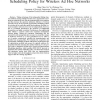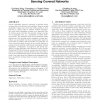27 search results - page 4 / 6 » Analysis of a Distributed Algorithm to Determine Multiple Ro... |
OPODIS
2010
13 years 5 months ago
2010
Abstract. Wireless Ad-hoc networks are distributed systems that often reside in error-prone environments. Self-stabilization lets the system recover autonomously from an arbitrary ...
GLOBECOM
2007
IEEE
14 years 2 months ago
2007
IEEE
— 1 Taking advantage of the independent fading channel conditions among multiple wireless users, opportunistic transmissions schedule the user with the instantaneously best condi...
MOBIHOC
2004
ACM
14 years 7 months ago
2004
ACM
Greedy geographic routing is attractive in wireless sensor networks due to its efficiency and scalability. However, greedy geographic routing may incur long routing paths or even ...
MOBIHOC
2006
ACM
14 years 7 months ago
2006
ACM
MLS is a distributed location service to track the position of mobile nodes and to route messages between any two nodes. The lookup of nodes is achieved by searching in a hierarch...
ISCC
2007
IEEE
14 years 1 months ago
2007
IEEE
In this paper, we investigate some of the issues that arise when mobile nodes engage voice connections with remote peers by using a wireless ad hoc network (MANET–cell) to acces...


